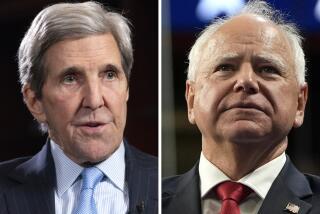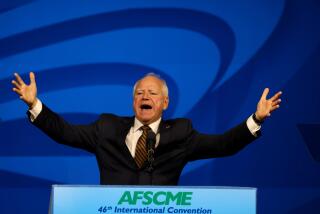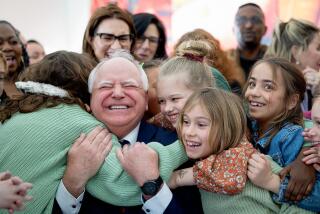Presidential Campaign 2000: It’s High Time for a Head Start
DES MOINES — As Republican Lamar Alexander stumped this fall in Iowa with his eyes firmly fixed on the 2000 presidential race, some folks wondered if the former Tennessee governor hadn’t gotten his calendar out of kilter.
“Isn’t it early to be in Iowa?” Alexander was asked.
“No,” he replied. “In some ways, it’s too late not to be in Iowa.”
Bizarre as this view may seem to the majority of Americans, it is widely shared in the intense world of political activists and would-be White House aspirants. As a result, the next presidential campaign is getting off to what appears to be its earliest start ever.
“We’ve had more activity than ever before at this stage of the cycle,” said Steve Grubbs, GOP chairman in the Hawkeye State, a key early battleground.
In both parties, the competition for the presidency has been stimulated by the fact that for only the third time in the post-World War II period, the job is held by an incumbent who can’t run again.
But most of the activity in Iowa--as well as elsewhere--revolves around Republican contenders. And again a historical factor is at work: For the first time since 1940, when dark horse Wendell Willkie came out of nowhere to capture the nomination, the GOP lacks a clear front-runner.
“There is no Michael Jordan,” said Rep. John R. Kasich (R-Ohio), chairman of the House Budget Committee and one of many ambitious party leaders trying to take advantage of that void.
On the Democratic side, Vice President Al Gore is heavily favored to win the nomination. Still, Iowa Democratic Party Chairman Mike Peterson notes that House Minority Leader Richard A. Gephardt (D-Mo.), Sen. Paul Wellstone of Minnesota and the Rev. Jesse Jackson have made several stops in Iowa this year.
Just last week, Gephardt traveled to Des Moines for a visit that reflected the grass-roots nature of the current activities: His schedule included joining state Democratic lawmakers in calling for smaller class sizes in Iowa schools.
“While Gore may be the presumptive nominee, there is an honest debate going on in our party over fiscal policy and trade policy,” Peterson said. “The presidential nomination in the Democratic Party will be fought over those very issues, and whoever wins will take the party in a new direction in the next century.”
Not only are presidential prospects canvassing Iowa, where caucuses kick off the delegate-selection process, they also are swarming New Hampshire, site of the nation’s first primary.
“It seems like every weekend this fall we had another event with another potential candidate,” said state Democratic Chairman Jeff Woodburn, who points to recent visits by Gephardt, Wellstone and Sen. Bob Kerrey of Nebraska.
Among Republicans, the list is even longer--Alexander, Kasich, publishing magnate Steve Forbes, former vice president Dan Quayle, Sen. John Ashcroft of Missouri and Sen. John McCain of Arizona are among the potential GOP nominees who have found reason to show up in the Granite State.
Of course, no candidate has formally announced. And of the dozen or so prospects now roaming the hustings, a fair number will never reach that stage. For now, the White House hopefuls focus on helping state and local candidates in 1998, making friends who presumably will boost them in 2000.
The early start to the GOP presidential competition could set the stage for a portentous shift, Kasich said.
“We are in the midst of a significant generational change in our party,” he said. The important issue facing GOP leaders, the 45-year-old lawmaker contended, is whether this shift will go beyond age to fundamentals, such as the party’s willingness “to take on the political system in a pretty direct way, to shake things up.”
Kasich, whose fiscal conservatism is tinged with Populism, demonstrated what he means when, at a recent talk to young Republicans in Des Moines, he urged an end to special tax breaks for corporations. “Corporate welfare ought to go, and the Republican Party ought to lead the way. If we can go as a party and eliminate welfare for poor people, we ought to eliminate it for rich people as well.”
More to Read
Get the L.A. Times Politics newsletter
Deeply reported insights into legislation, politics and policy from Sacramento, Washington and beyond. In your inbox three times per week.
You may occasionally receive promotional content from the Los Angeles Times.










